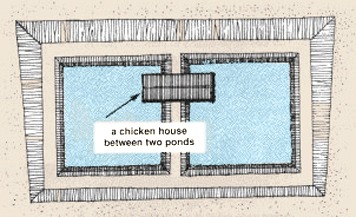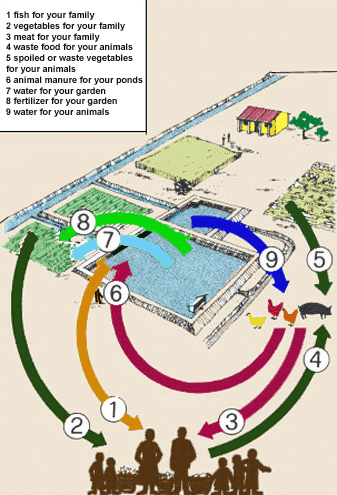17. YOUR FARM AND YOUR FISH PONDS
|
(521) Today, many farmers have learned that they can manage their fish ponds together with their farm animals, gardens and fields so that they will all grow better and produce more. (522) Fish, animals and plants live and grow in different ways and produce different things that can help all of them to live and grow better. |
(523) You have already learned how to put animal manure into your ponds so that the water will be rich in the natural foods that your fish need to eat. In this way, the animals help the fish to live and grow better. (524) Here are some other ways to manage your farm animals, gardens and fields so that they will help each other to grow better and produce more. |
|
(525) You can raise ducks in your fish ponds so that much of their manure will go into the water. This will help your fish to grow. At the same time, the ducks will feed on the plants that grow in your ponds and help to keep your ponds free of plants, weeds and snails. |
|
|
(526) You can raise chickens or pigs near your ponds. If you build chicken houses and pig pens on the banks or over the ponds, you can sweep the manure into the ponds. Your ponds will supply water for the animals and the animals will supply fertilizer to help keep the water in your ponds rich. |
|
|
Note: If you have built your ponds side by side, you can build a chicken house or pig pen on top of the bank between two ponds and sweep the manure into both ponds.
|
(527) Begin with either four to five ducks, five to eight chickens or one to two pigs for each 100 square metres of pond. Later you may be able to keep even more.
|
|
(528) You can plant vegetables on the banks of your ponds. You can plant such things as tomatoes, beans, soybeans, groundnuts or maize. (529) You can also have a garden nearby. This way, you can use the water from your ponds to water your vegetables. (530) When you drain the water from your ponds to harvest the fish, you will find a layer of soft mud on the bottom. This soft mud is a very good fertilizer to put on your garden or fields, or on your pond banks if you are growing vegetables there. (531) Spoiled vegetables or vegetable wastes such as plant leaves and stalks can be fed to your chickens, ducks or pigs or they can be put into your ponds for your fish to eat or made into compost to help keep the water green and rich. (532) So, you can see that with very little extra work you can manage your fish, ducks, chickens, pigs, farm fields and garden in such a way that they will help each other to produce more. |
|
Summary
YOU HAVE LEARNED HOW TO MAKE YOUR FARM AND YOUR PONDS WORK TOGETHER
Raise your ducks, chickens and pigs near your ponds, and each day sweep some manure in the water to keep it green
- be careful not to put too much manure in your ponds
- per 100 square metres of water use at most the manure of
- 4 to 5 ducks or
- 5 to 8 chickens or
- 1 to 2 pigs
It will be easier to water your garden if it is close to a pond
You can also raise vegetables on the banks of your ponds
You can use mud from the pond bottom to fertilize your gardens
Vegetable wastes make good compost
Vegetable wastes can also be fed to your fish and other animals




